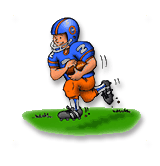 According to the American Academy of Orthopedic Surgeons, 448,000 football-related injuries occur to children and teenagers under age 15 each year. These injuries are treated in clinics, doctor’s offices and emergency departments throughout the country. In addition, 20 percent of high school football players sustain mild to severe traumatic brain injuries and players with brain injuries are six times as likely to sustain new injuries.
According to the American Academy of Orthopedic Surgeons, 448,000 football-related injuries occur to children and teenagers under age 15 each year. These injuries are treated in clinics, doctor’s offices and emergency departments throughout the country. In addition, 20 percent of high school football players sustain mild to severe traumatic brain injuries and players with brain injuries are six times as likely to sustain new injuries.
Safety Tips
In order to help prevent injuries on the gridiron, appropriate protective equipment is the best place to start. Necessary equipment includes:
- Helmets
- Shoulder pads, hip pads, tail pads and knee pads
- Pants (one piece or shell)
- Thigh guards
- Athletic supporter
- Mouth guard with keeper strap. Mouth guards do more than protect teeth. They protect lips, cheeks and the tongue from being cut or bruised. They also reduce the chances of jawbone fractures by absorbing the energy of blows to the face.
- Shoes – Players can wear sneakers or non-detachable, rubber-cleated shoes. Detachable cleats of a soft composition also are allowed in some leagues. Check with your coach about the type of shoes allowed in your league.
- If eyeglasses must be worn, they should be approved glasses with non-shattering safety glass. Contact lenses can be worn alternatively.
Make sure equipment is age- and size-appropriate and in good condition.
In addition to the proper equipment, general injury prevention guidelines also need to be followed. Take the following steps to ensure player safety.
- Have your child get a physical before each season.
- Children and youths should be in proper physical condition to play football. They should train and participate in conditioning practices before each season.
- Make sure the head coach has the appropriate qualifications.
- Make sure the coach is aware of any medical conditions your child may have.
- Ensure that there is a person certified in CPR and first aid present for all games and practices.
- Steroids have been shown to increase muscle mass, but can cause serious life-threatening complications. Encourage players to not use steroids.
- Teach players the rules of the sport.
- Encourage players to let the coach know when they are hurt.
- Warm up before playing and cool down afterwards to prevent muscle pulls and tendon ruptures.
- Drink enough water or sport drink before, during and after all games and practices.









 According to the American Academy of Orthopedic Surgeons, 448,000 football-related injuries occur to children and teenagers under age 15 each year. These injuries are treated in clinics, doctor’s offices and emergency departments throughout the country. In addition, 20 percent of high school football players sustain mild to severe traumatic brain injuries and players with brain injuries are six times as likely to sustain new injuries.
According to the American Academy of Orthopedic Surgeons, 448,000 football-related injuries occur to children and teenagers under age 15 each year. These injuries are treated in clinics, doctor’s offices and emergency departments throughout the country. In addition, 20 percent of high school football players sustain mild to severe traumatic brain injuries and players with brain injuries are six times as likely to sustain new injuries.